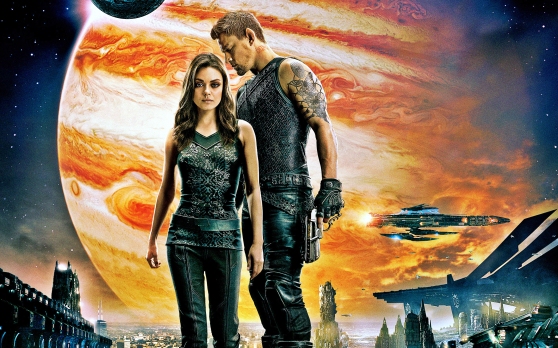I saw Jupiter Ascending this week and had to drive no less than 30 minutes across the smallest state in the country in order to do so because the movie is quickly disappearing from cinemas in the Providence area. Before I saw the movie, I figured that trend was probably a fairly objective judgment of quality on this film. After all, its Rotten Tomatoes rating on the critical side is currently drawing even with 50 Shades of Grey. I expected to have a little fun at the movie’s expense, enjoy the much-praised costume design, and probably a very woobified Channing Tatum, but I was surprised by what I got instead.
This movie loves science fiction in a way that it seems we haven’t really loved science fiction since the mid-80s. There’s no genre-obliged tongue in cheek awkwardness about otherworldly elements; in fact there there’s no eye-rolling at all in this movie. Jupiter Ascending dives into aliens, the expansiveness of the universe, advanced technologies, and genetic splicing with an earnestness that made me nostalgic and didn’t so much beg for my suspension of disbelief as it took it for granted. I bought the ticket to a Sci-Fi movie after all, I find myself wondering what it is I expect of the genre lately. It’s not like we expect a tip of the hat from award shows in genre filmmaking in any category aside from special effects anyway, so why write to the academy or the critics? This movie is a treat for fans.
And when I say this movie is a treat for fans, I mostly mean fangirls. Jupiter Jones is likeable but not in a hyperbolic way, interesting and sharp but not in a way that would ever keep a viewer from feeling like they could also reasonably be a secret space princess who incidentally charms bees. There were moments in the movie in which I found myself thinking, “well that was convenient,” but none of those moments were more reasonably convenient than any logic-defying Die Hard stunt I’ve ever seen John McClane’s American every-man pull off in that series. For example, there’s a point in the movie in which Jupiter finds herself in a refinery that is falling apart beneath her feet and she runs an obstacle course of toppling pillars, crumbling structures, and grates with plumes of flame shooting up through the floors at intervals reminiscent of a level of Super Mario Brothers or Donkey Kong minus the barrels. Flames shoot up seconds after she has stepped out of the way and grates topple from impossible heights after she’s stepped off them as she climbs upward. Most of her successes throughout the film are in fact some combination of coincidence, timing, and nerve; an oft-criticized trait in female heroes and a trait completely taken for granted in the male ones.
We have a hard time defining the female power fantasy and that in itself is probably a good thing since women are not a homogenous group with uniform needs and desires, but we have defined pretty conclusively that the female power fantasy doesn’t include existing for the male gaze, being made one-dimensional, or being objectified. These are not moves that empower women the way that John McClanes and Bruce Waynes are meant to empower men. In a media so overrun by the one-dimensional “strong female character” that calling a character as much has turned from praise to criticism, we need to find authentic female power fantasies to give women a reflection of power they could conceivably own. As a writer, I struggle with the idea that most of these so-called strong female character types are somehow inauthentic as women. I think these women do exist because women come in a nearly infinite variety. The problem with the strong female character type is not her existence (though when she’s poorly written she’s a pain) but that she is the only acceptable option.
Jupiter, though, gets pretty close to female power fantasy in a way that many of our most progressive young superheroines also embody. Her power is not a result of trauma, not forced upon her, or bestowed upon her by a man- it is an inborn trait- quite literally in this narrative because her very own genetic makeup gives her the ability to bestow her inheritance on (spiritually speaking) her own reincarnated soul. At the start of the movie she is an undocumented immigrant housekeeper who loves, works with, and lives with her extended family so she has very little privilege to aspire to, making her an excellent every-woman who can prove that there’s something special about her (and by extension her presumably-average probably working class audience.) If the male power fantasy is about attainability, the female power fantasy should not feel lofty, out of reach, or alien to her intended audience. Jupiter is bright, resourceful, tough enough to go toe to toe with her villain and approachable enough to be befriended by her employer in her underwear. She gets scooped up and whisked away often in the movie, but sets her own terms when the occasion calls for it; flat out refusing to abandon her family when danger comes calling.
Another essential dimension to Jupiter’s female-power-fantasy status is that she is not the conquest in relationship. She pointedly and confidently pursues her male love interest, Caine Wise, not to the exclusion of all else or to an exaggerated degree, but with a certainty that we typically find very recognizable on a hero rather than a heroine. Wise’s reluctance puts her in a position of seducer rather than object to be won subverting typical princess tropes and putting even romantic agency back in female hands.
My only real criticism of the movie was the surprising lack of queer representation. Tatum doesn’t exactly bring anything to this role that couldn’t have been equally if not more charming coming from Natalie Dormer, Emily Blunt, Rachel Nichols, or my personal pet-casting, Tabrett Bethell. This movie never allows its feet to touch the ground and yet somehow ends up disappointingly heteronormative. The scraps in this genre for queer people are meager enough without queer writers contributing to erasure.
So are the perceived weaknesses and failures of this Wachowski film born in the expectations set on the shoulders of female characters? We may not be able to truly say until after the film’s inevitable cult status is achieved. I know I will be very surprised if this film is not still being written about many years after its DVD release.


